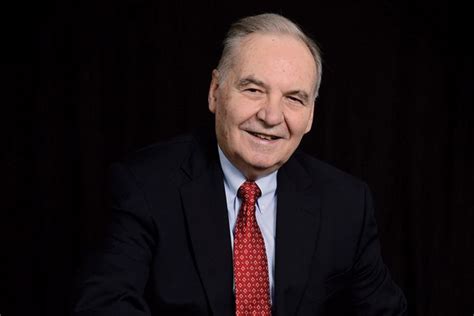A Quote by Ellen G. White
In regard to infallibility, I never claimed it; God alone is infallible. His word is true, and in Him is no variableness, or shadow of turning.
Related Quotes
Perhaps I had better inform my Protestant readers that the famous Dogma of Papal Infallibility is by far the most modest pretension of the kind in existence. Compared with our infallible democracies, our infallible medical councils, our infallible astronomers, our infallible judges, and our infallible parliaments, the Pope is on his knees in the dust confessing his ignorance before the throne of God, asking only that as to certain historical matters on which he has clearly more sources of information open to him than anyone else his decision shall be taken as final.
Do you desire security? Here you have it. The Lord says to you, "I will never abandon you, I will always be with you." If a good man made you such a promise, you would trust him. God makes it, and do you doubt? Do you seek a support more sure than the word of God, which is infallible? Surely, He has made the promise, He has written it, He has pledged His word for it, it is most certain.
To me the sole hope of human salvation lies in teaching Man to regard himself as an experiment in the realization of God, to regard his hands as God's hand, his brain as God's brain, his purpose as God's purpose. He must regard God as a helpless Longing, which longed him into existence by its desperate need for an executive organ.
God utters me like a word containing a partial thought of him. A word will never be able to comprehend the voice that utters it. But if I am true to the concept that God utters in me, if I am true to the thought of Him that I was meant to embody, I shall be full of his actuality and find him everywhere in myself, and find myself nowhere.
Infallible denotes the quality of never deceiving or misleading and so means wholly trustworthy and reliable; inerrant means wholly true. Scripture is termed infallible and inerrant to express the conviction that all its teaching is the utterance of God who cannot lie, whose word, once spoken, abides for ever, and that therefore it may be trusted implicitly.
When a man’s heart is cold and unconcerned about religion – when his hands are never employed in doing God’s work – when his feet are not familiar with God’s ways – when his tongue is seldom or never used in prayer and praise – when his eyes are blind to the beauty of the kingdom of heaven – when his mind is full of the world, and has no room for spiritual things – when these marks are to be found in a man the word of the Bible is the right word to use about him, and that word is, ‘Dead.’
One of the most effective ways to pray is to ask God to give you a promise from his Word concerning whatever it is you're praying for. Then hold him to his Word as you pray it back to him. It's what has been called "reversed thunder." God keeps his Word, and basing our prayer on his Word gives our prayers strength and confidence because we know we're asking for something God wants to give us.
St. Augustine and St. Thomas define mortal sin to be a turning away from God: that is, the turning of one's back upon God, leaving the Creator for the sake of the creature. What punishment would that subject deserve who, while his king was giving him a command, contemptuously turned his back upon him to go and transgress his orders? This is what the sinner does; and this is punished in hell with the pain of loss, that is, the loss of God, a punishment richly deserved by him who in this life turns his back upon his sovereign good.
A person does not...stand motionless and clear before our eyes with his merits, his defects, his plans, his intentions with regard to ourself exposed on his surface...but is a shadow which we can never succeed in penetrating...a shadow behind which we can alternately imagine, with equal justification, that there burns the flame of hatred and of love.
Men talk of "the mistakes of Scripture." I thank God that I have never met with any. Mistakes of translation there may be, for translators are men. But mistakes of the original word there never can be, for the God who spoke it is infallible, and so is every word he speaks, and in that confidence we find delightful rest.
There was a man that hated his footprints and his shadow, so one day he thought that if he ran fast enough, his footprints and shadow would not be able to follow him and then he never ever had to look at them again. He ran and he ran as fast as he could, but the shadow and the footprints had no problems keeping up to him. And he ran even faster and all of a sudden he fell dead to the ground. But if he been standing still there hadn't been any footprints and if he had been resting under a tree his shadow had been swallowed of the trees shadow.





































